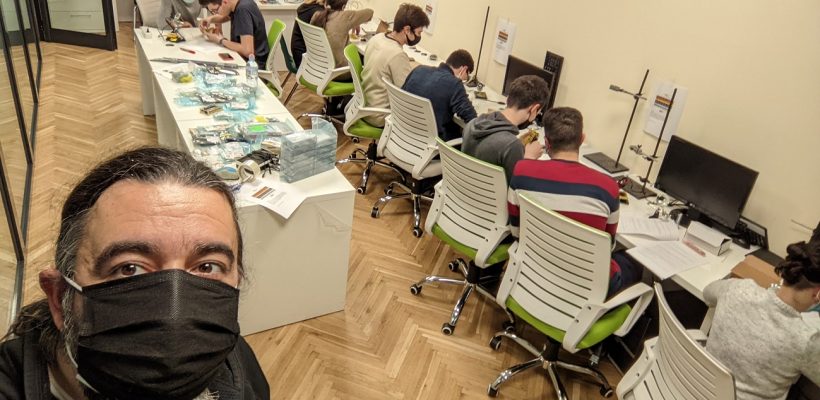
MISTI-AUA Collaboration Marks a Huge Success
3 min readYEREVAN, Armenia — On January 10-28, 2022, the MIT International Science and Technology Initiative (MISTI) Global Teaching Labs (GTL) program, in collaboration with the AUA Akian College of Science and Engineering (CSE), organized an informative lecture series and hands-on workshop for science and engineering enthusiasts. This collaborative initiative marked a successful and productive start for the year affording a positive learning experience for participating students and all those engaged.
Within the framework of the MISTI program at AUA, MIT Associate Professor of Nuclear Science and Engineering Dr. Areg Danagoulian and AUA adjunct lecturer Maro Aghazarian ran a series of short courses, lasting 1-3 weeks each. These covered various fields of science, from astronomy, nuclear science, thermodynamics, and reactor design to circuits, dynamics, and robotics, as well as an additional week-long course titled “The (Materials) Science of Life.”
The students also had the opportunity to participate in a DIY Geiger Workshop on Radiation, where they acquired both theoretical knowledge as well as hands-on laboratory experience. “It was a pleasure to see so many bright students and other individuals interested in STEM, broadening their horizons and expressing eagerness to learn, to absorb all that they could,” remarked Aghazarian. “We received a tremendously positive response, though sadly we could not accommodate all aspirants due to COVID-19 restrictions.”
The collaboration also extended the exceptional opportunity for four MIT undergraduates to teach in the program: Bethany Belleque, Brendan Vaughan, Zoe Fisher, and Zachary Francis. Through MISTI, these four MIT students gained the unique experience of teaching at AUA and delivering an international perspective, a key component of the MISTI mission. “The students’ ability to mirror my enthusiasm made the experience absolutely fantastic,” said Fisher. “They were so eager to learn about nuclear science, and I was able to figure out how to best explain the subjects in which I’ve immersed myself throughout my entire undergraduate studies. That was phenomenally rewarding.”
The program was equally valuable for AUA students who were able to expand their knowledge within the relevant fields of study and broaden their horizons. Reflecting on the MISTI program, AUA student Areg Hovhannisyan noted, “I had an amazing time in all the courses I could attend, especially the Geiger counter workshop led by Prof. Danagoulian. The application of nuclear science, electrical engineering, statistics, and hands-on engineering was a thrilling experience, unlike anything I’ve had before.”
To a large extent, the program was successful due to the eagerness, motivation, and passion of the students. Throughout the courses, they worked hands-on with Dr. Danagoulian to build their own Geiger counters. They could then use these radiation detectors to measure background and other sources of radiation, as well as experiment with collecting and analyzing data from the detector. This hands-on experience served as a creative boost that injected students with renewed enthusiasm for the sciences. “My goals were multiple,” says Dr. Danagoulian. “I wanted to teach AUA students about the basics of nuclear physics and nuclear detection, which is so critical given Armenia’s reliance on nuclear power as a source of energy, and to show them the importance of multidisciplinary work, as most modern problems require multidisciplinary approaches.”
The MISTI-AUA collaborative program’s success will encourage and model the organization of more such programs in the future. It may also interest other diaspora scientists to undertake similar efforts in Armenia.
Founded in 1991, the American University of Armenia (AUA) is a private, independent university located in Yerevan, Armenia, affiliated with the University of California, and accredited by the WASC Senior College and University Commission in the United States. AUA provides local and international students with Western-style education through top-quality undergraduate, graduate, and certificate programs, promotes research and innovation, encourages civic engagement and community service, and fosters democratic values.
